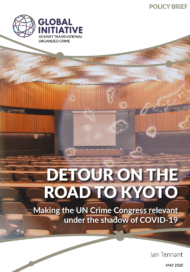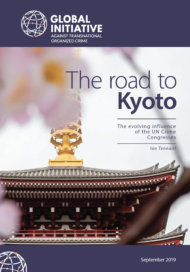Event Details
Where
The events will be available to stream live for registered Congress participants (they will not be live streamed to the general public). We will post these recordings on this page following the events.
#AssassinationsWitness: monitoring assassinations and bearing witness to the victims of organized crime
Thursday 11th March, 9:00 -10:30 JST (1am – 2:30am CET)
The Global Illicit Economy: trajectories of organized crime
Thursday 11th March, 14:00 – 15:30 JST (6am – 07:30am CET)
Resilience Fund: Supporting Community Responses to Organized Crime
Friday 12th March, 11:30 – 13:00 JST (3:30am – 5:00am CET)
Posted on 17 Feb 2021
End of the Road to Kyoto
The Global Initiative Against Transnational Organized Crime (GI-TOC) formed part of a diverse and active 400-strong civil society contingent that attended the 14th UN Congress on Crime Prevention and Criminal Justice. Here we present some selected highlights of our participation and contributions to the discussion at the congress.
The Congress on Crime Prevention and Criminal Justice closed on 12 April, following six days of events, statements, discussions and interaction – hosted, for the first time, in a hybrid format, with physical meetings held in Kyoto, the host city, supported by an online meeting platform. The GI-TOC organized three ancillary events, and took part in several more, in partnership with the governments of Switzerland and Mexico, and the UN Office on Drugs and Crime (UNODC). We were also pleased to engage with and follow the activities of numerous members of the GI-TOC Network of Experts throughout the congress.
Despite the challenges of stakeholder engagement in the era of COVID-19 and the partly online nature of the congress meetings, not to mention the broader barriers that civil society faces at the UN, there was a rich variety of civil society-led meetings and meaningful exchange. GI-TOC analysts, researchers and directors contributed throughout, with a focus on the nature and manifestations of organized crime, and how to build more effective, holistic responses. Below are the highlights of the week from the perspective of the GI-TOC.
Launch of flagship GI-TOC report: The Global Illicit Economy: Trajectories of Transnational Organized Crime
Our major output of the week was the launch of this ground-breaking report, funded by the governments of Switzerland and Norway, which analyzes and plots graphically the exponential growth in and diversification of illicit markets and economies from 2000 to today. It is a call to action to governments, the international community and civil society to recognize the impact and adaptability of organized crime as it has developed over the last two decades, and how it is projected to continue to change, morph and mutate. The report underlines the urgency of the need to update and reboot our responses to transnational organized crime.
At the launch event for the report, GI-TOC senior adviser Jean-Paul Laborde highlighted the relevance of this new study to the Crime Congress, indicating a lack of progress in harnessing the available tools and measures to tackle crime. In particular, Laborde emphasized the importance of civil society being integrated in crime prevention: ‘We have not heard the voice of the victims, or the NGOs who try to prevent crime. Without this, we will not be able to tackle organized crime in the right way.’
Comprehensive strategies, multi-stakeholder approaches
GI-TOC director Mark Shaw delivered our main statement to the congress. Focusing on the topic of ‘comprehensive strategies for crime prevention and criminal justice towards the achievement of Agenda 2030’, he cautioned against the fragmented nature of the current multilateral response to organized crime, and emphasized the need to include civil society in a more cohesive and joined-up response paradigm, echoing the findings from the Global Illicit Economy report.
The need to incorporate civil society in the response model was highlighted in the same debate by the UNODC and several country delegations. In her closing address to the congress, the Japanese Minister of Justice repeatedly put a strong emphasis on the importance of multi-stakeholder responses to crime prevention and criminal justice, including civil society inclusion.
#AssassinationWitness
The harms caused by organized crime and the inhuman violence associated with it should not be forgotten, and to emphasize this we organized an ancillary event to showcase the GI-TOC’s #AssassinationWitness campaign and the Global Monitor of Assassinations. Through this campaign and project, we aim to raise public awareness of the sacrifices made by civil society individuals and their families in the face of criminal threats, violence and murder.
Building community resilience
Despite the challenges, risks and threats posed by organized crime worldwide, there are some stories of hope and optimism. Through the Resilience Fund, supported financially by the governments of Norway and Germany, the GI-TOC supports over 80 organizations and individuals by helping them build their communities’ resilience to criminal governance. An event we organized enabled the voices of Resilience Fund grantees to be heard at the congress. NGOs and activists from Haiti, Colombia, Cambodia, Venezuela, DRC and Mexico spoke about their experiences in the face of organized crime in their communities. The Mexican Ambassador in Vienna spoke in support of the Fund, highlighting the role of civil society as the ‘first and best responders’ to organized crime, and urging donors to financially support the Resilience Fund.
Civil society: what’s in the Declaration?
Despite support for a broader civil society role vocalized by a range of countries in statements made at the congress, the meeting’s official outcome, the Kyoto Declaration, does not reflect vigorous support for civil society as partners of governments in tackling organized crime. Nor does the document make any meaningful progress in addressing the nature of illicit markets. Our earlier analysis of the Declaration content can be found here (pt1) and here (pt2), and the final episode of the podcast series “The Road to Kyoto” here. On the final day of the Congress, the GI-TOC presented an analysis of civil society engagement before and during the Congress.
Click here to read the presentation
Changing the trajectory
Although we have reached the end of the road to Kyoto, the Congress has shown us that we must continue on the longer road that will take us to a better understanding of illicit markets, work towards a more coordinated international response and encourage more meaningful engagement with civil society. We do not yet know where the next Crime Congress will be hosted in 2025, but it is already time to start considering how society and the trajectory of organized crime might change in those four years.
The GI-TOC, meanwhile, remains committed to working with governments, international organizations, and civil society to ensure that when the Congress next meets we are in a better position to understand the nature of organized crime and continue putting in place the building blocks of an enhanced global strategy to counter it.



